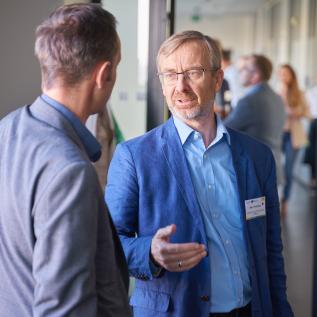Renewable energy communities in Marche Region

On 5 December 2024, the Policy Learning Platform organised a matchmaking at the request of Marche Region Italy, as Regional Managing Authority for sustainable energy to explore how to shape a 6 million call for proposals under the European Regional Development Fund for supporting energy communities in 2025. The matchmaking was held in Budapest, following the workshop on ‘Energy Communities: Building Citizen Acceptance and Engagement’.
Under Strategic Objective 2.2.1.2 of the Operational Programme, the region can support energy communities for the production/consumption of energy from renewable sources that also include smart grid systems and the application of innovative and/or otherwise high-efficiency technologies. The action aims to promote, throughout the region, the creation of energy communities for the production/consumption of energy from renewable sources. The main challenge that Marche Region is facing is how to support energy communities using the structural funds.
Participants
Host
- Lorenzo Federiconi, Department of Infrastructure, Territory and Civil Protection, Marche Region, Italy (EXPRESS)
Matchmaking Peers
- Dirk Vansintjan, REScoop.eu, Belgium
- Bence Kovács, Friends of the Earth, Hungary (DECA – Danube Energy Communities Accelerator)
- Anaïs Cognacq, ALEC Gironde, France (REC4EU)
Interreg Europe Policy Learning Platform
- Katharina Krell, Thematic Expert Low Carbon Economy
- Simon Hunkin, Thematic Expert Low Carbon Economy
- Mario Vadepied, Platform Assistant
Key recommendations
Ask the existing communities what challenges they have faced and design the details of the new call around their identified needs and their suggestions of what should be done. This bottom-up approach was used in Gironde, France.
The region should work with the stakeholders ahead of the call to raise awareness on the type of energy community projects the Region seeks to fund and to clarify what costs are eligible and what maturity the applicants should have. Questions could arise regarding energy community establishment costs or if applicants should already have a legal structure for their new energy community. It would be good to work with an existing structure that works on energy democracy topics to spread the word about the call.
If the call targets new energy communities AND requires for applicants to have a legal entity for their new energy community AND requires detailed information on the intended renewable energy project, including rights to use a roof or rights to use the land, then there is a risk that only mature projects proposed by professional applicants are fast enough to submit by the call deadline. To avoid this, communication must start months before the call is published. The call should be open long enough to allow for citizen-led initiatives for formalise their energy community and to get their project ready. Or a two-stage-call could be the more elegant solution.
To allow for truly citizen-led initiatives that don’t have a legal entity yet and whose renewable energy projects are not yet mature, the call could be designed in two stages: The first part could offer a small lump-sum amount for setting up a new energy community, creating a legal entity, identifying and making a pre-feasibility of a renewable energy project. At stage two, the call could offer funding for the project implementation itself. This would allow to build a funnel of new initiatives. Applicants could go to the stage of the call that is suitable for them (no obligation to use stage one). A negative result of the feasibility study would be an acceptable outcome of stage one. The call from Aquitaine is also staged and has adapted support for 5 different stages of maturity of the energy community, from concept – to project management- to investment, acquisition of external expertise; technical feasibility studies.
Just launching a call without building in restrictions can attract private players, e.g., fossil fuel companies, that are quicker and better organised than emerging energy communities. The call text could exclude large companies and allow only (regional) SMEs. It should contain strict conditions on governance of the applicant. It could reward specifically the number of citizens represented by each project.
The call should contain a maximum amount per project so that a single project does not capture all of the total available call budget. The call from Aquitaine Region contains differentiated maximum funding depending on type of project (different for PV, wind and bioenergy).
The call from Aquitaine contains a differentiated system for rewarding proposals that e.g. rewards truly citizen-led initiatives by giving extra points for higher numbers of citizens involved in projects. Extra points are also given for using local contractors, for an innovative nature of the project, etc. Marche could get inspired by the evaluation system of Aquitaine.
- The call details from Aquitaine will be shared with Marche Region, and Anais will put the colleagues in charge of the call at Aquitaine in touch with Lorenzo.
- REScoop.eu will send information on the LIFE project “Energy Communities Facility” (started in July ’24). For Italy the partner is Ricardo (consultancy). Info material exists in Italian. First calls are opening in a few months. The project can help in set-up, but also in validating business plans/business models.
- The Policy Learning Platform Potential could propose an online discussion/event looking only at calls for proposals to support energy communities and how they are designed in different regions.
Additional information
- Interreg Europe good practice on Regional Call For Proposal to support Participative and Citizen Projects for the Energy Transition
- Interreg Europe good practice on Regional funding for local advisors to support citizens' initiatives
- Community Energy Scotland organisation

Peer review publication
Find more information on the methodology and experiences of previous beneficiaries in our publication.

Apply for a peer review
Start your peer review application process today and find solutions to your policy challenge with our expert and peers!